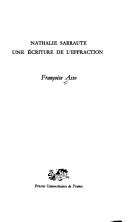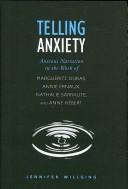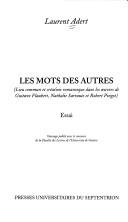| Listing 1 - 6 of 6 |
Sort by
|
Book
ISBN: 0729301273 8449959071 9780729301275 Year: 1982 Volume: 38 Publisher: London: Grant and Cutler,
Abstract | Keywords | Export | Availability | Bookmark
 Loading...
Loading...Choose an application
- Reference Manager
- EndNote
- RefWorks (Direct export to RefWorks)
Sarraute, Nathalie --- -Sarrot, N. --- Sarrot, Natali --- Saroṭ, Naṭali --- Tcherniak, Nathalie --- Tcherniak Sarraute, Nathalie --- סארוט, נאטאלי --- סארוט, נטלי --- Bibliography --- -Bibliography --- -Sarraute, Nathalie --- Sarrot, N. --- ROMAN FRANCAIS --- SARRAUTE (NATHALIE)

ISBN: 2130470211 9782130470212 Year: 1995 Volume: *52 Publisher: Paris: PUF,
Abstract | Keywords | Export | Availability | Bookmark
 Loading...
Loading...Choose an application
- Reference Manager
- EndNote
- RefWorks (Direct export to RefWorks)
Sarraute, Nathalie --- Criticism and interpretation --- Critique et interprétation --- -Sarrot, N. --- Sarrot, Natali --- Saroṭ, Naṭali --- Tcherniak, Nathalie --- Tcherniak Sarraute, Nathalie --- סארוט, נאטאלי --- סארוט, נטלי --- Criticism and interpretation. --- -Criticism and interpretation --- Sarraute, Nathalie, --- Critique et interprétation --- Sarrot, N. --- Sarraute, Nathalie - Criticism and interpretation

ISBN: 1442684852 9781442684850 9780802092762 0802092764 1487523688 Year: 2007 Publisher: Toronto ; Buffalo ; London University of Toronto Press
Abstract | Keywords | Export | Availability | Bookmark
 Loading...
Loading...Choose an application
- Reference Manager
- EndNote
- RefWorks (Direct export to RefWorks)
"From two world wars to rapid industrialization and population shifts, events of the twentieth century engendered cultural anxieties to an extent hitherto unseen, particularly in Europe. In Telling Anxiety, Jennifer Willging examines manifestations of such anxieties in the selected narratives of four women writing in French - Marguerite Duras, Nathalie Sarraute, Annie Ernaux, and Anne Hebert. Willging demonstrates that the anxieties inherent in these women's works (whether attributed to characters, narrators, or implied authors) are multiple in nature and relate to a general post-Second World War scepticism about the power of language to express non-linguistic phenomena such as the destruction and loss of life that a large portion of Europe endured during that period."--Jacket
Narration (Rhetoric) --- History --- Duras, Marguerite, --- Ernaux, Annie, --- Sarraute, Nathalie --- Hébert, Anne --- Sarrot, N. --- Sarrot, Natali --- Saroṭ, Naṭali --- Tcherniak, Nathalie --- Tcherniak Sarraute, Nathalie --- סארוט, נאטאלי --- סארוט, נטלי --- Criticism and interpretation. --- Duras, Marguerite --- デュラス, マルグリット --- デュラス, M. --- Dwirasŭ, Marŭgŭrittŭ --- Twirasŭ, Marŭgŭrittŭ --- Tu-la-ssu, Ma-ko-li-tʻe --- Dulasi, Magolite --- Tu, La-ssu --- Du, Lasi --- Di︠u︡ras, Marherit --- Дюрас, Маргерит --- דיראס, מרגריט --- Dûras, Margrît --- Doras, Margerête --- Doras, Margrête --- Donnadieu, Marguerite, --- Ernaux, Annie --- Rhetoric --- Discourse analysis, Narrative --- Narratees (Rhetoric)

ISBN: 2714302807 9782714302809 Year: 1988 Publisher: Paris: Corti,
Abstract | Keywords | Export | Availability | Bookmark
 Loading...
Loading...Choose an application
- Reference Manager
- EndNote
- RefWorks (Direct export to RefWorks)
Drama --- Pinget, Robert --- Sarraute, Nathalie --- Duras, Marguerite --- French drama --- Dialogue. --- Authors and the theater. --- History and criticism. --- Dramatic works. --- 840-2 "19" --- Franse literatuur: toneel; drama--20e eeuw. Periode 1900-1999 --- 840-2 "19" Franse literatuur: toneel; drama--20e eeuw. Periode 1900-1999 --- Authors and theater --- Dialogue --- Dialog --- Authors and the theater --- Theater and authors --- Theater --- Copyright --- Stage adaptations --- History and criticism --- Performing rights --- Sarrot, N. --- Sarrot, Natali --- Saroṭ, Naṭali --- Tcherniak, Nathalie --- Tcherniak Sarraute, Nathalie --- סארוט, נאטאלי --- סארוט, נטלי --- Dwirasŭ, Marŭgŭrittŭ --- Twirasŭ, Marŭgŭrittŭ --- Tu-la-ssu, Ma-ko-li-tʻe --- Dulasi, Magolite --- Tu, La-ssu --- Du, Lasi --- Di︠u︡ras, Marherit --- Дюрас, Маргерит --- דיראס, מרגריט --- Dûras, Margrît --- Doras, Margerête --- Doras, Margrête --- Donnadieu, Marguerite, --- デュラス, マルグリット --- デュラス, M. --- French drama - 20th century - History and criticism. --- Sarraute, Nathalie - Dramatic works. --- Pinget, Robert - Dramatic works. --- Duras, Marguerite - Dramatic works. --- NOUVEAU ROMAN --- ROMAN FRANCAIS --- PINGET (ROBERT), 1919-1997 --- THEATRE --- SARRAUTE (NATHALIE) --- DURAS (MARGUERITE)

ISBN: 2859394923 2757426362 9782859394929 Year: 1996 Volume: *66 Publisher: Paris: Presses universitaires du Septentrion,
Abstract | Keywords | Export | Availability | Bookmark
 Loading...
Loading...Choose an application
- Reference Manager
- EndNote
- RefWorks (Direct export to RefWorks)
Toute parole collective, quelle qu’elle soit, est une fiction, en ce sens qu’il n’existe pas de Sujet collectif susceptible d’en soutenir réellement l’énonciation. Les romans de Gustave Flaubert, de Nathalie Sarraute et de Robert Pinget, sur lesquels porte cet essai, prennent chacun à sa manière ce discours impossible pour matériau ; ils en éclairent les linéaments, en scrutent les failles, en interrogent les rêves, les fantasmes et la violence. Ce que parler veut dire à l’échelle collective, telle est la réalité que l’art romanesque s’emploie ici à interroger, suppléant ainsi à un métadiscours introuvable sur la nature de ce qui lie les hommes ensemble. Les trois romanciers examinés cherchent moins à s’exprimer personnellement à travers leur œuvre qu’à interroger la présence et les effets d’un discours collectif a la fois omniprésent et inconsistant. Le langage n’est plus simplement l’instrument de leur art, mais l’objet principal et même exclusif de leur questionnement esthétique. Ce déplacement est d’une grande importance et marque l’émergence d’une crise de confiance, laquelle peut d’ailleurs éclairer en grande partie le passage de l’âge romantique à l’âge moderne : la promotion de la parole à l’avant-scène du roman s’accompagne à l’évidence d’une défiance, à tout le moins d’une inquiétude ; le soupçon qu’elle échoue à exprimer le sujet qui la profère, la découverte, au fond, d’une espèce d’aphasie au cœur de la parole, hante en effet les romans de Flaubert, Sarraute et Pinget. Tel que ces œuvres l’articulent, ce soupçon n’a rien d’abstrait ni de métaphysique ; il concerne à chaque fois l’incidence du discours collectif dans l’usage de la parole et donne lieu à ce que l’on pourrait appeler une problématique romanesque de l’aliénation verbale. Flaubert, incontestablement, marque l’apparition d’une telle problématique dans les Lettres, inaugurant ainsi l’une des grandes voies du roman moderne et contemporain. La méthode adoptée dans cet essai procède par lectures…
Pinget, Robert --- Flaubert, Gustave --- Sarraute, Nathalie --- French fiction --- Roman français --- History and criticism --- Histoire et critique --- Flaubert, Gustave, --- Style, Literary. --- Cliches. --- History and criticism. --- Roman français --- French fiction - 20th century - History and criticism. --- French fiction - 19th century - History and criticism --- Literary style. --- Clichés. --- Criticism and interpretation. --- Commonplaces --- Terms and phrases --- Literature --- Style, Literary --- Language and languages --- Rhetoric --- Style --- Sarrot, N. --- Sarrot, Natali --- Saroṭ, Naṭali --- Tcherniak, Nathalie --- Tcherniak Sarraute, Nathalie --- סארוט, נאטאלי --- סארוט, נטלי --- Flaubert, Gustaw, --- Flober, Gi︠u︡stav, --- Fu-lou-pai, --- Fu, Lou-pai, --- Fu-lou-pai, Chü-ssu-tʻa fu, --- Fuloubai, --- Phlōmper, Gkystav, --- Phlōmper, Goustauos, --- Флобер, Гюстав, --- פלאבער, ג. --- פלאבער, גוסטאוו, --- פלובר, גוסטאב --- 福樓拜, --- Flūbir, Gūstāv, --- Flūbir, Gūstāw, --- فلوبر، گوستاو --- fiction

ISBN: 0813020212 9780813020211 0813013976 9780813013978 Year: 1996 Publisher: Gainesville Tallahassee Tampa University Press of Florida
Abstract | Keywords | Export | Availability | Bookmark
 Loading...
Loading...Choose an application
- Reference Manager
- EndNote
- RefWorks (Direct export to RefWorks)
French prose literature --- Autobiography. --- Self in literature. --- Autobiography --- Self in literature --- Romance Literatures --- Languages & Literatures --- French Literature --- Autobiographies --- Egodocuments --- Memoirs --- Biography as a literary form --- History and criticism. --- History and criticism --- Technique --- Sarraute, Nathalie --- Duras, Marguerite --- Robbe-Grillet, Alain, --- Grillet, Alain Robbe-, --- Rob-Grije, Alen, --- Rob-Grii︠e︡, Alen, --- Robb-Griie, A. --- Роб-Ґріє, Ален, --- روب-غرييه، ألن --- デュラス, マルグリット --- デュラス, M. --- Dwirasŭ, Marŭgŭrittŭ --- Twirasŭ, Marŭgŭrittŭ --- Tu-la-ssu, Ma-ko-li-tʻe --- Dulasi, Magolite --- Tu, La-ssu --- Du, Lasi --- Di︠u︡ras, Marherit --- Дюрас, Маргерит --- דיראס, מרגריט --- Dûras, Margrît --- Doras, Margerête --- Doras, Margrête --- Donnadieu, Marguerite, --- Sarrot, N. --- Sarrot, Natali --- Saroṭ, Naṭali --- Tcherniak, Nathalie --- Tcherniak Sarraute, Nathalie --- סארוט, נאטאלי --- סארוט, נטלי --- Criticism and interpretation. --- 20th century --- Robbe-Grillet, Alain
| Listing 1 - 6 of 6 |
Sort by
|

 Search
Search Feedback
Feedback About UniCat
About UniCat  Help
Help News
News